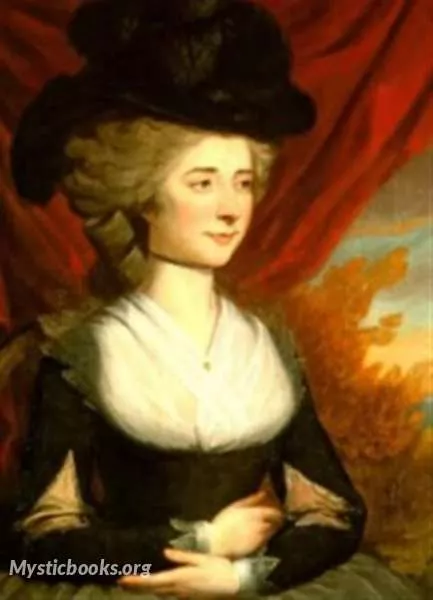
Timeline
Title
Country/Nationality
Fanny Burney
Frances Burney also known as Fanny Burney and later Madame d'Arblay, was an English satirical novelist, diarist and playwright. Born in Lynn Regis, now King's Lynn, England, on 13 June 1752, to the musician Dr Charles Burney (1726–1814) and his first wife, Esther Sleepe Burney (1725–1762), she was the third of her mother's six children. She began her "scribblings" at the age of ten. In 1786–1790 she held an unusual courtier appointment as "Keeper of the Robes" to Charlotte of Mecklenburg-Strelitz, George III's queen. In 1793, aged 41, she married a French exile, General Alexandre D'Arblay. Their only son Alexander was born in 1794. After a long writing career, and travels in which warfare stranded her in France for over ten years, she settled in Bath, England, where she died on 6 January 1840. The first of her four novels, Evelina (1778), was the most successful and remains the most highly regarded. Most of her plays were not performed in her lifetime. She wrote a memoir of her father (1832) and many letters and journals, which have been gradually published since 1889.
Frances Burney was a novelist, diarist and playwright. In all, she wrote four novels, eight plays, one biography and twenty-five volumes of journals and letters. She has gained critical respect in her own right, but she also foreshadowed such novelists of manners with a satirical bent as Jane Austen and William Makepeace Thackeray.
She published her first novel, Evelina, anonymously in 1778. During that period, novel reading was frowned upon as something young women of a certain social status should not do, while novel writing was out of the question. Burney feared that her father would discover what she called her "scribblings". When she published Evelina anonymously, she only told her siblings and two trusted aunts. Eventually her father read the novel and guessed that Burney was its author. News of her identity spread. The novel brought Burney almost immediate fame with its unique narrative and comic strengths. She followed it with Cecilia in 1782, Camilla in 1796 and The Wanderer in 1814.
All Burney's novels explore the lives of English aristocrats and satirise their social pretensions and personal foibles, with an eye to larger questions such as the politics of female identity. With one exception, Burney never succeeded in having her plays performed, largely due to objections from her father, who thought that publicity from such an effort would be damaging to her reputation. The exception was Edwy and Elgiva, which unfortunately was not well received by the public and closed after the first night's performance.
Although her novels were hugely popular during her lifetime, Burney's reputation as a writer of fiction suffered after her death at the hands of biographers and critics, who felt that the extensive diaries, published posthumously in 1842–1846, offer a more interesting and accurate portrait of 18th-century life. Today critics are returning to her novels and plays with renewed interest in her outlook on the social lives and struggles of women in a predominantly male-oriented culture. Scholars continue to value Burney's diaries as well, for their candid depictions of English society.
Through her whole writing career, Burney's talent for satirical caricature was widely acknowledged: figures such as Dr Samuel Johnson, Edmund Burke, Hester Thrale and David Garrick were among her admirers. Her early novels were read and enjoyed by Jane Austen, whose own title Pride and Prejudice derives from the final pages of Cecilia. Thackeray is said to have drawn on the first-person account of the Battle of Waterloo recorded in her diaries while writing his Vanity Fair.
Burney's early career was strongly affected by her relations with her father and the critical attentions of a family friend, Samuel Crisp. Both encouraged her writing, but used their influence in a critical fashion, dissuading her from publishing or performing her dramatic comedies, as they saw the genre as inappropriate for a lady. Many feminist critics have since seen her as an author whose natural talent for satire was somewhat stifled by such social pressures on female authors. Burney persisted despite the setbacks. When her comedies were poorly received, she returned to novel writing, and later tried her hand at tragedy. She supported both herself and her family on the proceeds of her later novels, Camilla and The Wanderer.
Frances Burney died on 6 January 1840. She was buried with her son and her husband in Walcot cemetery in Bath. A gravestone was later erected in the churchyard of St Swithin's across the road, adjacent to that of Jane Austen's father, George Austen.
Books by Fanny Burney

Evelina
Evelina, or the History of a Young Lady's Entrance into the World is a novel written by English author Fanny Burney and first published in 1778. Although published anonymously, its authorship was revealed by the poet George Huddesford in what Burney...

The Wanderer
The Wanderer; or, Female Difficulties is Frances Burney’s last novel. Published in March 1814 by Longman, Hurst, Rees, Orme and Brown, this historical novel with Gothic overtones set during the 1790s tells the story of a mysterious woman who attempts...

Cecilia: Memoirs of an Heiress
The plot of Cecilia revolves around the heroine, Cecilia Beverley, whose inheritance from her uncle comes with the stipulation that she find a husband who will accept her name. This proves impossible, and she gives up her fortune to marry for love.Ja...

Camilla
Camilla, Frances Burney's third novel, delves into the complexities of love, courtship, and societal expectations in late 18th-century England. The story centers around Camilla, a young woman navigating the delicate dance of love and duty. Her affect...

Early Diary of Frances Burney, Vol. 1
The Early Diary of Frances Burney, Volume 1, offers an intimate glimpse into the life and experiences of the renowned novelist and diarist Fanny Burney. This volume chronicles her formative years, providing a vivid account of her observations and int...

Early Diary of Frances Burney, Vol. 2
Fanny Burney's diaries provide a unique and intimate glimpse into the life of a young woman navigating the social and literary circles of late 18th-century England. Burney, later a renowned novelist, chronicles her experiences with wit and candor, of...